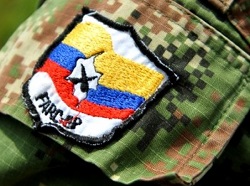Claims that elements of the FARC guerrilla organization are defying its leadership’s orders to stop extorting people during the final stages of peace talks with the government of Colombia provide the latest warning sign that a many insurgents may refuse to demobilize in order to continue their criminal activities.
The governor of the central department of Tolima, Óscar Barreto, has denounced elements of the Revolutionary Armed Forces of Colombia (Fuerzas Armadas Revolucionarias de Colombia – FARC) for continuing to extort citizens, Noticias RCN reported. The news comes despite a July 2016 order to halt such activities by the group’s commander-in-chief, Timoleón Jiménez, alias “Timochenko.”
Governor Barreto said the FARC was extorting “in the same way as it has done in the past,” as had been denounced by residents of the municipalities of Planadas, Roncesvalles and Cajamarca. During a recent festival, Barreto told Noticias RCN, the group’s 21st Front extorted liquor vendors, while in Roncesvalles, the guerrilla group has allegedly been summoning locals to fund the political party they claim to be forming.
SEE ALSO: Coverage of Extortion
The Tolima governor called for Colombian President Juan Manual Santos to demand that the FARC respect the agreements being made in Havana, Cuba, where peace negotiations have been taking place since 2012.
InSight Crime Analysis
Signs that FARC factions may not be obeying orders from Havana give weight to the worrying prospect that the guerrilla leadership does not have as much control over its fighters as it says. Indeed, based on months of field research in different parts of Colombia, InSight Crime estimates that about a third of FARC fighters will choose to criminalize rather than laying down their arms once a final agreement is reached.
The 21st Front may fall into this category. Tolima was the birthplace of the guerrilla organization in the 1960s, but the Joint Central Command (Comando Conjunto Central) that used to form the main FARC bloc in the area disappeared following the death of FARC commander-in-chief Guillermo León Sáenz, alias “Alfonso Cano,” in 2011. The 21st Front now exerts control over the territory the central command bloc once occupied. During a 2016 investigation in Tolima, InSight Crime determined that this unit was extorting locals and not channeling the funds up the chain of command.
The front’s apparent divergence from the FARC’s stated policy has been detected in other parts of Colombia where the guerrillas operate. Extortion has historically been a principal means of sustaining the insurgency, and there have been indications that mid-level commanders are using the practice to accumulate funds behind their leaders’ backs in advance of demobilization.
Recent reports say the FARC continue to impose extortion fees on civilians in departments including Caquetá, Casanare and Huila. In certain parts of Antioquia department, locals have denounced that the FARC are not only still extorting but also imposing social control through threats and intimidation.
SEE ALSO: Coverage of FARC Peace
However, continued extortion does not necessarily mean the noncompliant units will refuse to demobilize. In places such as Ituango municipality, Antioquia — where the guerrillas look ready to hand over their weapons when the time comes — the 18th Front has replaced their usual tax with requests for a “voluntary contribution” in the context of the imminent “post-conflict.” A similar modality has been observed in Meta department.
InSight Crime sources in Havana have suggested that the Colombian government is expecting to have a final peace deal signed by next month. But with both conforming and more insubordinate FARC factions already shirking direct orders, there are serious doubts about the rebel organization’s ability to militarily and ideologically unite its troops in time.

